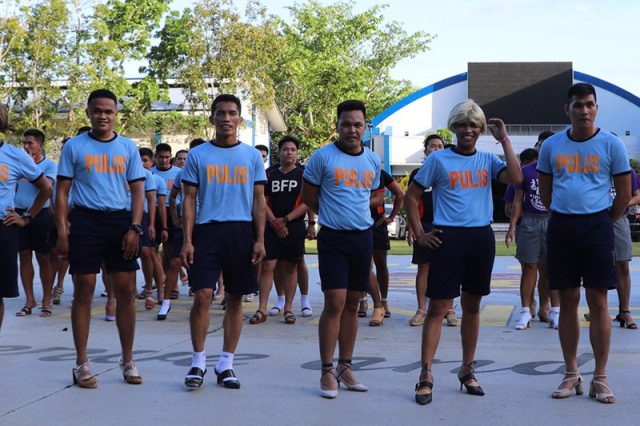
Filipino social media users raised questions about the initiative of male police officers in Leyte for the National Women’s Month this March.
A video of members of the Philippine National Police running in stilettos or stiletto heels went viral on Facebook and Twitter over the weekend, courtesy of a weekly news magazine show.
The social media accounts of “Kapuso Mo Jessica Soho” on March 18 and 19 posted clips of the initiative as it reported on the PNP Regional Office 8 (PRO-8)’s annual “stiletto run” where male members of the police force don stiletto heels to supposedly honor females.
The magazine show on Facebook quoted one of the police officers identified as “Brevin,” who said that he volunteered to join the initiative since he wanted to try it “out of curiosity.”
“May mga nagsasabi, ‘Ba’t ka sumali? Ang laki ng katawan mo, hindi bagay.’ Eh sa akin, hindi po ako nahihiya kasi ang training naman sa amin, maging adaptive sa mga gagawin,” he said before.
“‘Yung stiletto, way of training din naman. Makikita mo kung balance ka kung tumakbo. Nu’ng na-try ko ‘yung stiletto, doon ko lalong na-realize na mas dapat respetuhin ang mga babae. Kasi nakakabilib ‘yung mga kaya nilang gawin,” Brevin added.
The video has earned over 201,000 views on Facebook and a whopping number of 1.7 million views on Twitter so far.
It was also posted on KMJS’ Instagram account, where it has gained over 4,250 likes so far.
Pictures of the initiative can also be viewed on the PRO-8’s Facebook page.
‘Performative’
The “stiletto run” mostly earned criticism on Twitter where some Pinoys questioned the activity’s purpose and how it has an impact in genuinely honoring women.
“Huh? Anong klaseng expression of support ‘yan? Papansin ang tawag diyan! Kung gusto niyo talagang pahalagahan ang kababaihan, protektahan niyo mga karapatan nila at igalang sila!!!” a Twitter user exclaimed.
“I FEEL IT’S more of a mockery than respecting the women’s [rights]. I don’t know. Maybe it’s just my lack of Pinoy sense of humor sometimes,” another Filipino commented with an exhaling face emoji.
“Out of all the policies [or] programs that would’ve been substantial in effecting real change in women’s lives, we get a PR [public relations] stunt that downplays [women’s] oppression to a pair of stilettos and makes their suffering a subject of mockery and entertainment,” wrote a different Pinoy.
“[Seriously], how low can you go??” she added.
Others argued that the initiative further highlights men more than the women they were supposed to pay tribute.
“Cute, buuuut it IS National Momen’s Month, yet the main headline is still about men? Did you all not pause to think that there’s something ironic in that… lol,” a Twitter user commented.
“Men be like: how can we make this women’s month about us?” another online user wrote with vomiting face emoijs.
A law student claimed the initiative was “performative,” arguing that “the struggles of women in the police force go beyond wearing heels.”
“Performative” is usually associated with the definition of doing something “for show,” so as ” to bolster one’s own image or make a positive impression on others.”
“Why are we allowing the police to get away with it in our society where queers and transwomen are already ostracized for wearing heels?” the law student tweeted.
“The said event reeks of hypocrisy [because] it doesn’t solve the problem of gender inequality nor celebrates women. It allows policemen to dress in heels while transgender people and queers are killed and subjected to discrimination simply for wearing heels,” the online user added.
Sociologist and women’s advocate Athena Presto expressed similar views.
“The thing about this ‘solidarity’ event is that it trivializes women’s varied, systemically defined struggles as simply that of wearing stilettos,” she tweeted.
“If the intention is to shed light on the pains that women experience in their daily lives, then this event becomes exclusive for women in heels — mainly, working women under the public gaze,” Presto added.
“Events that only involve a stiletto run, therefore, have marginal (if not none at all) awareness-raising benefits and may actually have a counterproductive effect. Because they only highlight women’s public struggle, they further invisibilized those that are suffered in private,” she continued.
Presto also took note of how some male police officers exhibited “exaggerated gait and flailing of arms” during the run, which she said made “women’s struggles into mockery and [a] spectacle.”
“The PNP stiletto run, especially the way it was conducted, is counterproductive,” the sociologist added.
The initiative
The stiletto run was first conducted by the PRO-8 in 2019 under the leadership of then-Police Brigadier General Dionardo Bernardo Carlos, who was the PNP’s Eastern Visayas director at that time.
The PRO-8 previously said that the initiative’s purpose was “to let men taste how it feels to wear stiletto shoes.”
The Police Community Affairs and Development Group of Western Visayas added that it was PRO-8’s way of paying tribute and saluting the female police officers of the region.
Stiletto shoes or stiletto heels are a type of high-heeled shoes for women which are usually above two or three inches tall. It is also known for the thinness of its heels.
Those who are not accustomed to wearing it may feel uncomfortable since high heels increase the amount of pressure on one’s feet, pushing a person’s body forward and changing the way they balance and walk.
Meanwhile, the country is observing National Women’s Month (NWM) this March in conjunction with International Women’s Day.
In the Philippines, the NWM serves as a venue to highlight women’s achievements and to discuss continuing and emerging women’s empowerment and gender equality issues and concerns, challenges, and commitments.
The celebration focuses on concrete activities that are aligned with national and international instruments and treaties, such as the Convention on the Elimination of All Forms of Discrimination Against Women, the Beijing Platform for Action, the Philippine Plan for Gender-Responsive Development (1995-2025), the Framework Plan for Women, and the Sustainable Development Goals.









